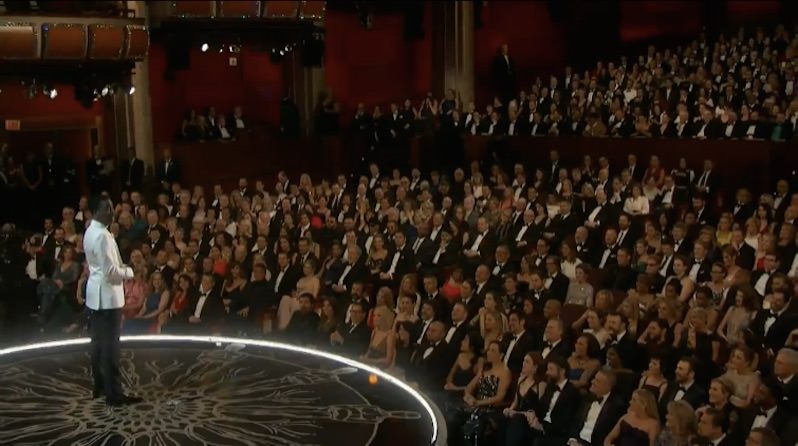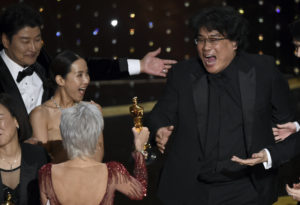Oscars 2016 Review: Chris Rock Pulls Off the Ultimate Balancing Act
The actor and comedian was tapped to criticize the academy that had hired him, but he walked the tightrope with grace and blistering humor. Vox
Vox
“Spotlight” was named best picture at the Oscars on Sunday night, Leonardo DiCaprio finally won his statuette and “Mad Max: Fury Road” took home the most awards—six in all. But the evening’s real winner was Chris Rock.
In his hosting gig, Rock—comedian, actor and filmmaker—was in a hard place. This is the second consecutive year in which not one actor of color was nominated, a situation dubbed #OscarsSoWhite on social media. Many prominent African-American actors and filmmakers—among them Will and Jada Pinkett Smith, Ryan Coogler, Ava DuVernay and Spike Lee—elected to be elsewhere. Rock’s job was to criticize the academy that had hired him.
He walked the tightrope with grace and blistering humor.
After a montage of 2016 movies, Rock strolled out. “I counted at least 15 black people in that,” he observed. He welcomed everyone to the 88th Academy Awards, “otherwise known as the White People’s Choice Awards.” “Why are we protesting this Oscars?” he asked. “It’s the 88th Academy Awards, which means this ‘no black nominees’ thing happened at least 71 other times. … Black people did not protest. Why? Because we had real things to protest at the time. We were too busy being raped and lynched to care about who won best cinematography.”
In criticizing Hollywood’s snowblindness—seeing only white—Rock deflected criticism of the academy, unifying the industry on what threatened to be an evening of unease and divisiveness. (He also reprised a spot he did when he hosted the show in 2005: interviewing African-Americans at a Compton, Calif., theater and finding most moviegoers had not heard of Oscar-nominated films.)
“Spotlight,” a low-key ensemble film about Boston Globe investigative reporters who broke the story of the Boston Archdiocese cover-up of pedophile priests and their enablers by getting the testimony of their victims, took two awards: best picture and best original screenplay, shared by Josh Singer and director Tom McCarthy. Accepting their best picture prize, the film’s producers said they hoped the film would “resonate to the Vatican.”
For the second consecutive year, Alejandro Iñárritu won best director, this time for “The Revenant,” which won three awards. He is the first director to win back-to-back Oscars since Joseph Mankiewicz in 1950.
With his sixth nomination, “Revenant” star DiCaprio finally won the best actor prize that had eluded him, playing a real-life 19th century figure left for dead and hellbent on revenge against those who abandoned him. DiCaprio spoke onstage about how the film was about man’s relationship to nature and how he hoped that the production’s trouble in finding snow-covered terrain would raise awareness of global warming.
As expected, Brie Larson, who played an abducted woman living with her son in forced isolation, won the best actress statuette for “Room.” Alicia Vikander, as the wife who supports her husband’s choice to undergo sex-reassignment surgery in “The Danish Girl,” took supporting actress honors.
In an upset, Mark Rylance won the supporting actor prize for “Bridge of Spies,” although Sylvester Stallone was widely favored to win for “Creed.”
Political and social affirmations threaded through the evening’s acceptance speeches. Receiving his best adapted screenplay statuette for “The Big Short,” about the Wall Street crash of 2008, director and screenwriter Adam McKay declared that if candidates don’t want money to influence elected officials, they shouldn’t take it from big finance or “weirdo” billionaires.
Upon winning the Oscar for best animated film, Pete Docter, director of “Inside Out,” reminded teens that life can get difficult. “On the bad days,” he exhorted, “make something. Draw a picture. Write a song.”
Vice President Joe Biden took the stage to introduce Lady Gaga, who performed “Til It Happens to You,” a nominated song encouraging empathy toward victims of rape and abuse. (It did not win. Sam Smith and Jimmy Napes won the Oscar for “Writing’s on the Wall” from “Spectre.” Smith, who is gay, dedicated his statuette to the LGBT community.)
Now that DiCaprio has his Oscar, is it too much to ask that he no longer play characters who die or struggle with crazy ex-wives or are paralyzed by obsessive-compulsive disorder? Somebody please write this guy a screwball comedy.
Dig, Root, GrowThis year, we’re all on shaky ground, and the need for independent journalism has never been greater. A new administration is openly attacking free press — and the stakes couldn’t be higher.
Your support is more than a donation. It helps us dig deeper into hidden truths, root out corruption and misinformation, and grow an informed, resilient community.
Independent journalism like Truthdig doesn't just report the news — it helps cultivate a better future.
Your tax-deductible gift powers fearless reporting and uncompromising analysis. Together, we can protect democracy and expose the stories that must be told.
This spring, stand with our journalists.
Dig. Root. Grow. Cultivate a better future.
Donate today.






You need to be a supporter to comment.
There are currently no responses to this article.
Be the first to respond.